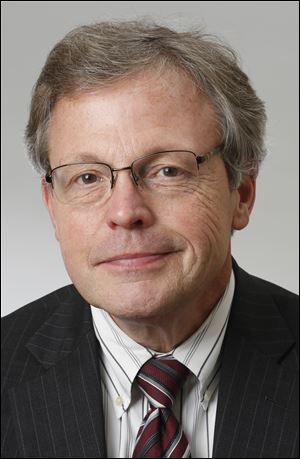
COMMENTARY
Reader questions coverage of local cable dispute
1/26/2014
Jack Lessenberry
Dennis Glowacki of Perrysburg wrote me, “I have a question regarding the current dispute between Buckeye Cable and Sinclair Broadcasting. Why is this issue not being written about?”
After making other observations and complaining about the NBC shows he missed, he added that he thought the paper would have told him much more about this issue if Buckeye Cablevision and The Blade did not have the same ownership.
So what does your ombudsman think?
Frankly, it is always difficult for any news organization to cover itself. No matter how careful editors and reporters are to be fair, there is always a suspicion of bias. I went through this personally many years ago, when I was a reporter and editor at the Detroit News and we had to cover a bitter and controversial battle over a proposed partial merger with the Detroit Free Press.
Nobody was completely happy with the coverage.
Covering another company that has the same ownership as your own is also difficult. The Blade and Buckeye CableSystem are entirely separate entities. But each are owned by Block Communications, Inc., a privately held media company.
What happened is this: In November, Maryland-based Sinclair Broadcast Group Inc., bought a group of TV stations including WNWO-TV, Channel 24, NBC’s affiliate in Toledo.
Contrary to Mr. Glowacki’s claim, this was reported in The Blade. Then, on Dec. 15, Sinclair ordered Buckeye CableSystem to stop carrying Channel 24 over its system.
The Blade reported this, quoting Jeff Abbas, Buckeye president and general manager as saying he regretted that move, but that “Buckeye simply cannot agree to pay Sinclair 10 times more for WNWO than what previous owners required.”
The Blade also noted that Matt Polka, the head of the American Cable Association, had complained to the Federal Communications Commission about Sinclair’s “anti-competitive practices” in markets such as Toledo.
Nothing wrong with any of that.
But, The Blade story does have one failing. Apparently, no attempt was made to get comment from Sinclair. Blade editors explained the story was developed right on deadline. That happens, but your ombudsman thinks even a last-minute call and an update, at least for the online edition, should have been made.
The Blade did much better in a story on the controversy Jan. 16 (“Buckeye offers viewers credit,”) extensively quoted a Sinclair vice president as to his company’s side of the dispute.
Essentially, The Blade’s coverage has been straightforward and balanced. The news stories should not be confused with the ads that Buckeye CableSystem has been running — and presumably paying for — in The Blade denouncing Sinclair.
The news department has no control over advertising. Your ombudsman would ideally like to see The Blade, in the interest of fairness, run an independent analysis of the dispute, perhaps hiring an independent journalist to do so.
From the coverage in the industry press, indications are that such a story might well favor Buckeye. Two California members of Congress have introduced legislation that, according to the ACA, would allow the FCC to forbid Sinclair from preventing Buckeye from broadcasting Channel 24’s signal.
For viewers, the good news is that WNWO is still available the old-fashioned way — over the air.
■ Toledo reader Rosa Graves did not like a headline on Page One on New Year’s Day: “Collins: Chief is hindering transition.”
“I don’t know how newspaper writers are taught in college, but this headline would lead the reader to believe that [Police] Chief [Derrick] Diggs was doing something bad to irritate the incoming mayor,” she said, adding “Only [late in the story do we] learn that Chief Diggs was doing his job by the book and the mayor-elect was the one who was rocking the boat.”
Well, your ombudsman — who does teach newspaper writing in college — didn’t read it that way. To me, the headline merely indicated that the mayor was complaining about the now-former chief. And the story itself was balanced.
However, I do think The Blade ought to have mentioned to the chief’s side before the seventh paragraph.
■ As I have discussed before, The Blade’s longstanding policy is only to use the honorific “Dr.” for people who have medical degrees.
The idea is partly to avoid confusion. There are boatloads of professors of everything from English literature to business who have PhD’s or other academic degrees that carry the title “doctor.”
But in the public mind, a “Dr.” is someone who practices medicine. However, reader Ann Meier caught the paper in an apparent contradiction. The Blade has been referring to “Dr. Martin Luther King, Jr.,” whose degree, in fact, was in theology.
I asked Blade Managing Editor Dave Murray about this, and he replied, “I would say that Dr. King is an historic figure in America and is known in the U.S. and in the world” as Dr. King.
What’s more, he noted, the formal name of the Toledo crossing is the “Dr. Martin Luther King, Jr., Memorial Bridge.”
For all those reasons, Mr. Murray said, “The Blade has decided to violate its own style,” when it comes to Dr. King. “To every rule, there is an exception,” he said.
One that, to your ombudsman, is totally justified.
Anyone who has a concern about fairness or accuracy in The Blade is invited to write me, c/o The Blade; 541 N. Superior St., Toledo, 43660, or at my Detroit office: 563 Manoogian Hall, Wayne State University, Detroit, MI 48202; call me, at 1-888-746-8610 or email me at OMBLADE@aol.com.
I cannot promise to address every question in the newspaper, but I do promise that everyone who contacts me with a serious question will get a personal reply.
If you don’t leave me an email address or a phone number, I have no way to get in touch with you.
Jack Lessenberry is a member of the journalism faculty at Wayne State University in Detroit and a former national editor of The Blade.